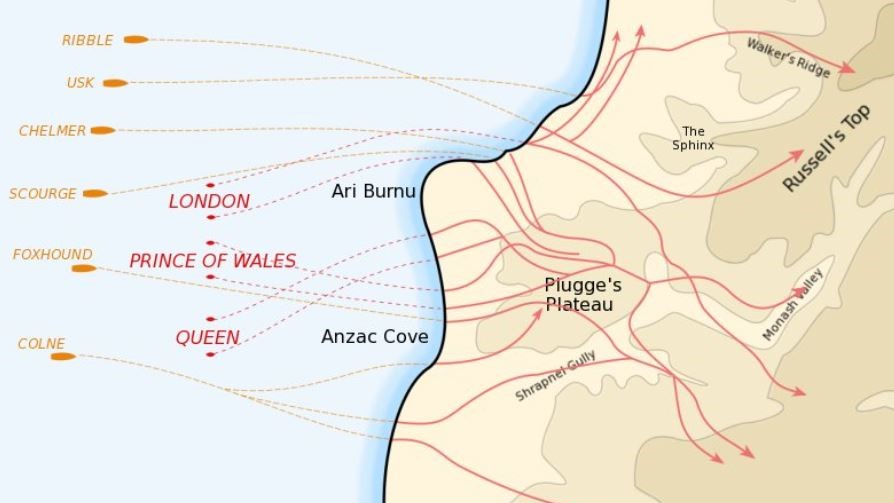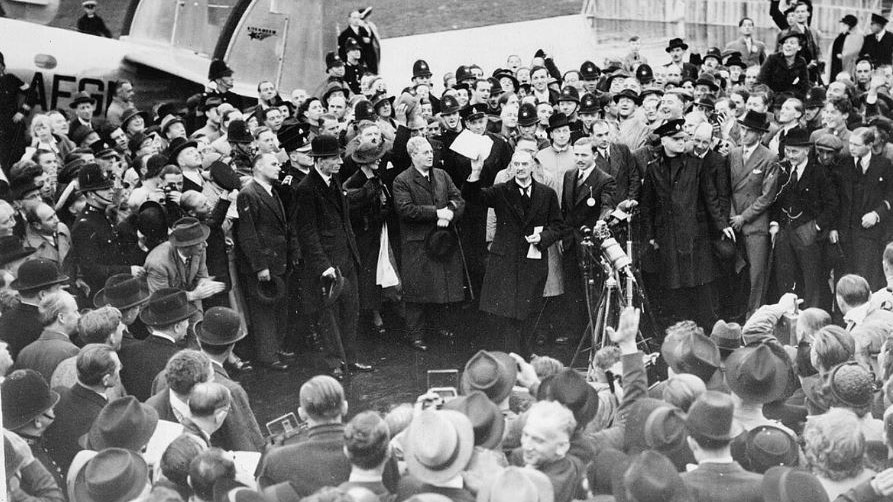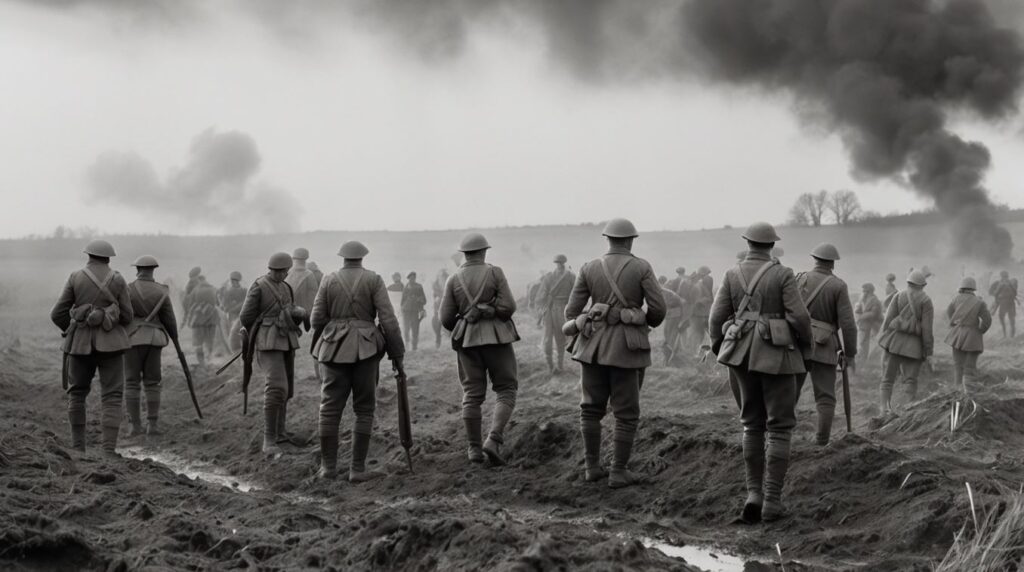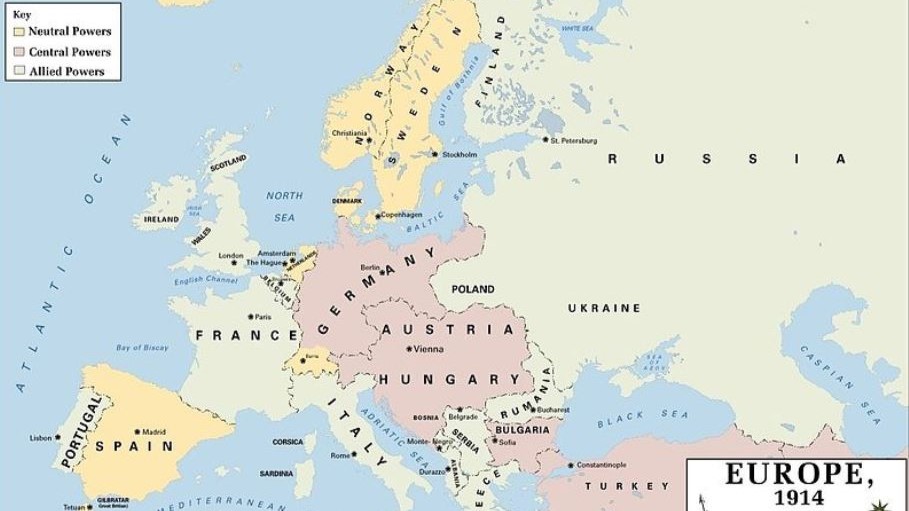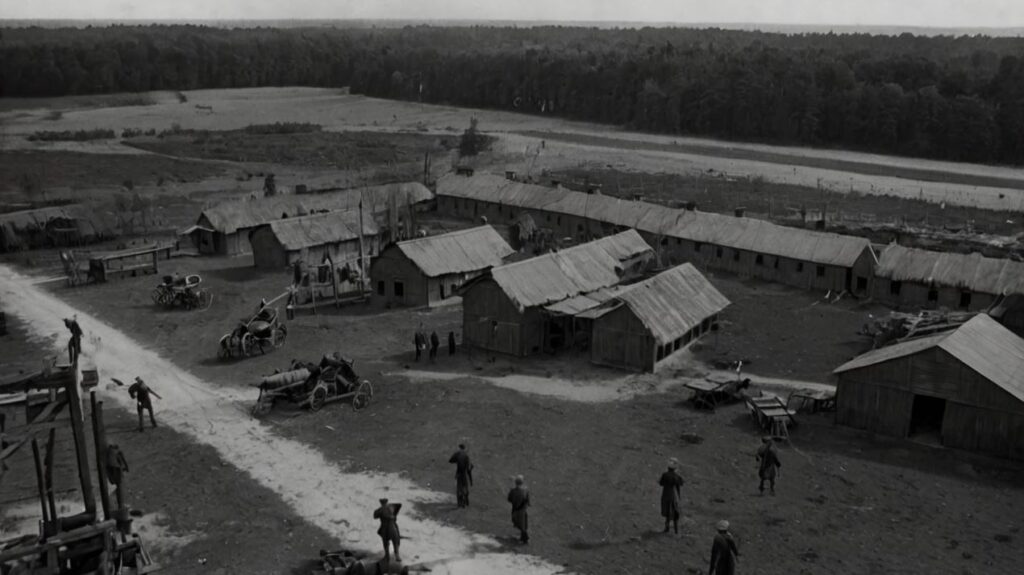The Gallipoli Campaign of 1915 stands as one of the most contentious military operations of World War I. This analysis explores the potential ramifications had this campaign achieved its objectives, examining the immediate and long-term consequences for both the war effort and the geopolitical landscape of the 20th century.
1. The Gallipoli That Never Was: Setting the Scene
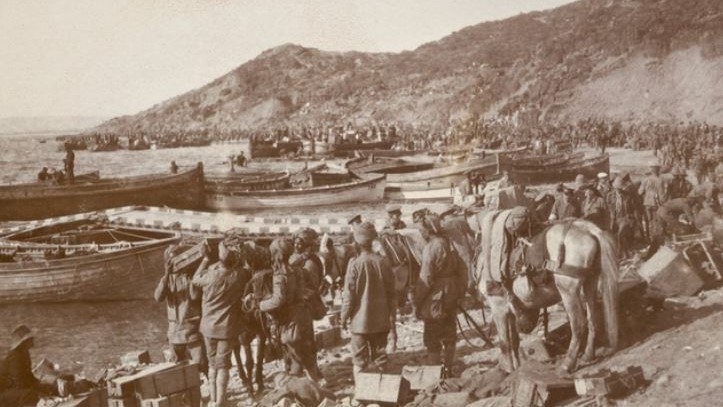
In 1915, the Western Front descended into a stalemate. In response, Allied strategists sought an alternative means to break the deadlock in the European theater of World War I.
Trench warfare and the brutal attrition along the Western Front made it clear that new strategies were necessary to gain an advantage over the Central Powers.
It was within this context that the Gallipoli Campaign was conceived.
Winston Churchill, then First Lord of the Admiralty, championed this bold plan. He aimed to knock the Ottoman Empire out of the war and to open a vital supply route to Russia through the Dardanelles Strait.
The strategic importance of securing the Dardanelles was paramount: it would not only weaken one of Germany’s key allies but also facilitate a direct supply line to the Eastern Front. This would potentially alleviating the pressure on the Russian army and reinvigorating the Allied war effort.
However, the campaign resulted in a costly failure.
The Allied forces, comprising significant contingents from Britain, France, Australia, and New Zealand (the ANZAC troops), faced formidable challenges.
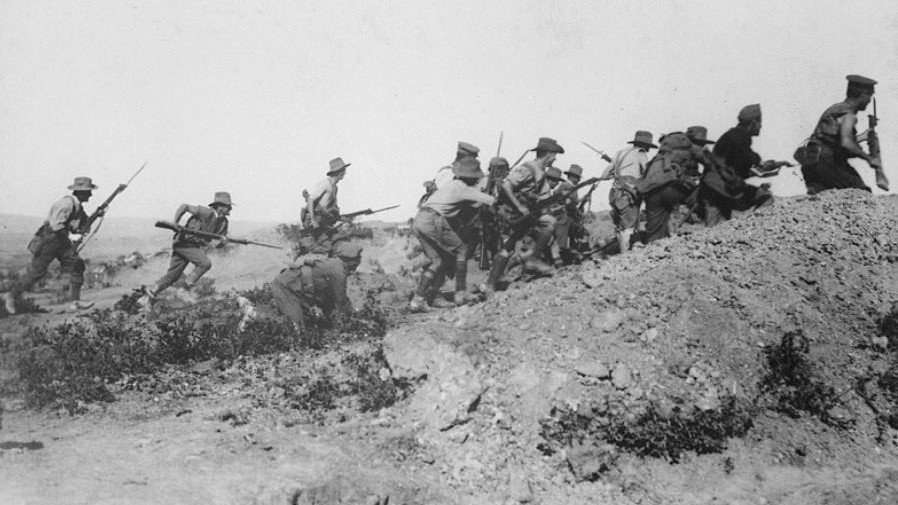
Poor intelligence, inadequate planning, and underestimation of the Ottoman forces led to disastrous outcomes.
Upon landing, Allied troops found themselves pinned down on narrow, inhospitable beaches.
The terrain favored the well-prepared Ottoman defenders, commanded by the astute Mustafa Kemal (later known as Atatürk).
Despite fierce fighting and tremendous bravery, the Allied forces were unable to secure the high ground or advance inland effectively.
The Gallipoli Campaign resulted in heavy casualties and a prolonged stalemate, mirroring the conditions on the Western Front.
The ANZAC forces, in particular, endured severe losses, which had a profound impact on the national consciousness of Australia and New Zealand.
The failure of the campaign also had significant political ramifications. Winston Churchill faced severe criticism and was ultimately demoted. The operational fiasco at Gallipoli further strained the morale of the Allied nations, as hopes for a swift and decisive victory were dashed.
2. How Gallipoli Could Have Succeeded

To envision a successful Gallipoli Campaign, several key factors would need to have been addressed:
- Improved Strategic Planning: A thorough understanding of the terrain and the strength of Ottoman defenses would have been crucial. Detailed reconnaissance and better intelligence gathering could have helped the Allies anticipate challenges and plan accordingly.
- Maintenance of Operational Security: Keeping plans and movements secret would have been essential to preserve the element of surprise. Preventing leaks to the Ottoman forces would have minimized the chances of encountering well-prepared defenses.
- Rapid Deployment and Advancement: After landing, Allied forces needed to push inland swiftly to secure key positions before Ottoman reinforcements could arrive. Speed and decisiveness were critical to establishing a strong foothold.
- Effective Naval and Logistical Support: Consistent and accurate naval gunfire support, along with efficient supply lines, would have been vital. Ensuring that troops had the necessary resources and support would have maintained momentum and morale.
- Coordinated Multi-Point Assault: Simultaneous landings at multiple locations could have overwhelmed Ottoman defenses. This would have spread their forces thin and created opportunities for the Allies to advance more effectively.
Given these improvements, one can hypothesize a scenario where Allied forces successfully secure the Gallipoli peninsula and advance towards Constantinople, compelling the Ottoman Empire to sue for peace.
3. The Impact of a Successful Gallipoli Campaign
The repercussions of a successful Gallipoli Campaign would have been significant and far-reaching:
Eastern Front
- Supply Lines to Russia: Opening supply lines to Russia would have allowed the Allies to send much-needed supplies, weapons, and reinforcements. This influx of resources could have bolstered the Russian army, which was struggling with shortages and logistical issues. A stronger Russian war effort might have prevented or at least delayed the internal crises that culminated in the Russian Revolution of 1917. With more support, the Russian military might have sustained its resistance against German and Austro-Hungarian forces, potentially changing the dynamics on the Eastern Front.
- Stabilization of the Balkans: The success at Gallipoli might have had a stabilizing effect on the Balkans. Countries such as Bulgaria, which joined the Central Powers in 1915, might have reconsidered their alliances if the Ottoman Empire, a key ally, was significantly weakened or knocked out of the war. The shift in power dynamics could have led to a more favorable situation for the Allies in the Balkan region, possibly preventing further escalation and opening new fronts against the Central Powers.
Western Front
- Redeployment of Troops: A victory at Gallipoli would have allowed the Allies to redeploy troops from the Ottoman theater to the Western Front. This strategic move could have shifted the balance of power against Germany. The additional forces would have strengthened Allied positions, enabling more robust offensives and potentially breaking the stalemate of trench warfare.
- Increased Allied Forces: The successful campaign could have led to an influx of approximately 2.5 million British Empire troops and 1 million Russian soldiers to the Western Front. This overwhelming force might have put immense pressure on German defenses, leading to significant breakthroughs. The increased manpower and resources could have accelerated the defeat of German forces, shortening the war and reducing casualties.
Neutral Powers
- Encouraging Neutral Nations: The demonstration of Allied strength and strategic success might have encouraged neutral nations to join the Allied cause earlier. Countries that were on the fence about entering the war might have been swayed by the apparent momentum and capability of the Allies. This could have led to earlier and more widespread support, further isolating the Central Powers and bolstering the Allied war effort.
- Impact on the United States: Conversely, the United States might have seen less imperative to enter the conflict if the Allies appeared to be gaining the upper hand without American intervention. This could have altered the trajectory of the U.S. towards becoming a global superpower. The delay or absence of U.S. involvement might have led to a different post-war landscape, with implications for international relations and the balance of power in the 20th century.
A successful Gallipoli Campaign would have had profound and wide-ranging impacts on World War I, reshaping the strategies and outcomes on multiple fronts.
4. Redrawing the Middle East
A successful Gallipoli Campaign would have had profound implications for the post-war Middle East, leading to a dramatically different geopolitical landscape.
Territorial Arrangements
Absence of the Sykes-Picot Agreement: A successful campaign might have negated the necessity for the Sykes-Picot Agreement, which divided Ottoman territories between Britain and France. Instead, the Allies might have pursued a more unified strategy for the region, potentially allowing for different territorial arrangements that better reflected the ethnic and religious composition of the Middle East.
Political Leadership
Absence of Mustafa Kemal Atatürk: The rise of Mustafa Kemal Atatürk, who became a national hero during the Gallipoli defense, was pivotal in the formation of modern Turkey. Without his prominence, Turkey’s evolution into a secular, modern state might not have occurred. The absence of Atatürk could have led to a more fragmented or less centralized Turkish state, altering the balance of power in the region.
European Influence
Increased European Colonial Control: With the Ottoman Empire weakened or dismantled, European powers might have expanded their colonial ambitions, exerting greater control over the Middle East. This increased European influence could have delayed the emergence of independent states, prolonging colonial rule and its associated impacts on regional development.
Cascading Effects on Regional Dynamics
National Identities: The development of national identities in the Middle East would have taken different paths. The absence of Ottoman influence and the lack of a unifying Turkish identity under Atatürk could have led to the rise of alternative national movements, potentially more fragmented and diverse.
Oil Resources: Control over oil resources, discovered in the early 20th century, would have been a critical factor. European powers might have had a tighter grip on these resources, influencing global energy politics and economic development in the Middle East. Alternatively, different regional powers might have emerged to control these valuable assets.
Arab Nationalism: The future of Arab nationalism could have been significantly altered. Without the post-war mandates and the influence of European powers, Arab nationalist movements might have either gained stronger momentum or faced greater fragmentation.
State of Israel: The eventual establishment of the State of Israel would also have been affected. The different territorial and political dynamics might have altered the course of Zionist movements and the British Mandate of Palestine, potentially leading to a different timeline or configuration for the establishment of Israel.
In summary, a successful Gallipoli Campaign would have reshaped the Middle East in multiple ways, impacting national identities, colonial control, and the geopolitical landscape for decades to come.
5. Changing the Course of the 20th Century
The ripple effects of a successful Gallipoli Campaign could have significantly altered the course of 20th-century history in several profound ways:
Duration of World War I
Earlier Conclusion of the War: A successful Gallipoli Campaign could have hastened the end of World War I by weakening the Central Powers and enabling a more coordinated Allied offensive on all fronts.
The earlier conclusion of the war might have spared millions of lives, reducing the overall human and economic toll.
Additionally, the post-war balance of power could have been different, potentially leading to a more stable and less punitive Treaty of Versailles, which might have fostered a more lasting peace.
Rise of Fascism
Impeded Rise of Nazi Ideology: The success at Gallipoli might have negated the “stab-in-the-back” myth in Germany, which blamed the military’s defeat on internal betrayal and political weakness.
Without this narrative, the conditions that facilitated the rise of Nazi ideology might have been less potent.
The absence of a galvanizing myth could have impeded the rise of Adolf Hitler and the National Socialist movement, altering the trajectory of German politics in the 1920s and 1930s.
Russian Revolution
Delayed or Averted Russian Revolution: If the Gallipoli Campaign had succeeded, and the Allies had opened supply lines to Russia, the bolstered Russian war effort might have delayed or even averted the Russian Revolution.
The continued support could have stabilized the Russian front, preventing the collapse of the Tsarist regime and the subsequent rise of Bolshevism.
This change would have profoundly impacted global politics, potentially preventing the Cold War and the widespread influence of communism throughout the 20th century.
Colonial Legacies
Different Decolonization Processes: Altered control of former Ottoman territories could have led to different decolonization processes.
The absence of the Sykes-Picot Agreement and different European colonial ambitions might have reshaped the political landscape of the Middle East, North Africa, and beyond.
The legacy of colonial rule might have taken a different path.
National Identities
Foundation for ANZAC National Identities: The triumph of the ANZACs (Australian and New Zealand Army Corps) at Gallipoli would have provided a different foundation for Australian and New Zealand national identities.
Instead of being remembered as a tragic defeat, Gallipoli could have been celebrated as a significant victory, fostering a sense of pride and accomplishment.
This success might have shaped the national narratives and identities of these countries. Influencing their roles in international affairs and their self-perception throughout the 20th century.
In summary, a successful Gallipoli Campaign could have dramatically altered the duration of World War I, the rise of fascism, the Russian Revolution, colonial legacies, military doctrine, and national identities, profoundly impacting the course of 20th-century history.
6. Final Thoughts: The Gallipoli That Could Have Been
The Gallipoli Campaign, whether in failure or hypothetical success, demonstrates the profound influence that single military operations can have on the course of history. This analysis underscores the delicate balance of factors that determine historical outcomes and the cascading effects that can stem from alterations to these factors.
In our timeline, the failure at Gallipoli had significant repercussions. In an alternate scenario where it succeeded, the impacts would have been equally, if not more, profound. It would have reshaped not only the immediate outcome of World War I but also the political, social, and economic landscape of the 20th century.
This exploration of an alternate Gallipoli outcome serves as a reminder of the complex interplay of events that shape our world. It highlights the value of historical analysis in understanding not just what did happen, but what could have happened, and how precarious the path of history often is.
The Gallipoli Campaign, successful or not, stands as a testament to the far-reaching consequences of military endeavours and the profound ways in which they can alter the course of global history.
FAQs
- What was the Gallipoli Campaign? The Gallipoli Campaign was an Allied attempt in 1915 to capture the Gallipoli peninsula in Turkey, aiming to knock the Ottoman Empire out of World War I and open a supply route to Russia.
- Why did the Gallipoli Campaign fail in real history? It failed due to poor planning, lack of surprise, inadequate supplies, and strong Ottoman resistance. The Allies were unable to break out of their beachheads and eventually had to evacuate.
- How could the Gallipoli Campaign have succeeded? Better planning, maintaining the element of surprise, decisive action after landing, and proper naval and logistical support could have led to success.
- What would have been the immediate effects of a successful Gallipoli Campaign? It could have knocked the Ottoman Empire out of the war, opened a supply route to Russia, potentially prevented or delayed the Russian Revolution, and freed up significant Allied forces for other fronts.
- Would a successful Gallipoli Campaign have shortened World War I? Possibly. By knocking out the Ottoman Empire and freeing up troops for the Western Front, it could have put more pressure on Germany and potentially ended the war earlier.
Further Reading
I hope you have found this blog post about What if the Gallipoli Campaign Succeeds? interesting. To find out more about World War 1, read here:
- The Haunting Russian Zombie Legends of World War I
- White Friday: A WW1 Tragedy on the Italian Front
- Militarism, Alliances, Imperialism, Nationalism: The MAIN causes of WWI
- Germany’s World War 1 Turnip Winter
- Did Any Civil War Veterans Serve in World War 1?
You may also enjoy these articles exploring ‘What If’ scenarios:

